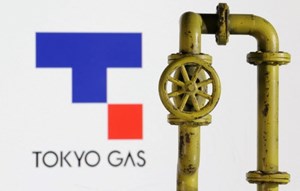Tokyo Gas to spend $1.4 B on renewable power at home and abroad
(Reuters) - Japan's Tokyo Gas is shifting its overseas focus to renewable energy and away from regional upstream gas projects as it seeks to combat climate change, its president said, although it will invest in liquefied natural gas (LNG).

In common with global peers, Japanese energy companies are changing their portfolios as they pursue 2050 carbon neutrality targets.
Japan's biggest city gas provider plans to spend 200 billion yen ($1.4 billion) over the next three years to boost its renewable capacity at home and abroad to 6 gigawatts by 2030 from 1.5 GW now, with a focus on offshore wind farms.
"We are shifting our overseas focus from upstream gas projects to renewable energy and Asia's infrastructure as we have limited resources ... and as we need to invest in decarbonization," President Shinichi Sasayama told Reuters.
"We should work on offshore wind power, especially floating, as it has great potential," he said in comments cleared for publication on Friday.
The process of divesting its stakes in Australia's gas projects is under way, but Australia continues to be an important LNG supplier, providing half of Tokyo Gas's imports, he said.
Apart from decarbonization, Tokyo Gas is focused on economics and spreading its risks after the Ukraine war underlined the dangers of dependency on Russian gas.
Sasayama said it was possible the company would invest in U.S. shale gas assets if they promised to be highly profitable.
Many long-term contracts for LNG were due for renewal around 2030 and the company would carefully consider which ones it signed, he said.
"Economics remains important, but flexibility in contract terms, including destination clauses, is also very important," he said.
Japan's energy uncertainties include doubts over the future of its nuclear sector, which until the Fukushima disaster of 2011, provided a huge part of the country's baseload power.
Sasayama said Tokyo Gas hoped therefore the government would provide support for new long-term LNG contracts to meet any shortfall, saying the risk was too great for a private company alone.
Among contracts Tokyo Gas has not renewed is one for a million metric tons a year with Brunei LNG that expired in March, Sasayama said. He declined to give the reason.
"We take a variety of projects into consideration and decide whether it is better to renew existing projects or sign new contracts, based on a comprehensive evaluation in terms of conditions and price," he said.
The company buys about 13 million ton of LNG a year from 13 projects in four countries, down from 15 in five countries a year ago.
Related News
Related News

- TotalEnergies and Mozambique announce the full restart of the $20-B Mozambique LNG project
- RWE strengthens partnerships with ADNOC and Masdar to enhance energy security in Germany and Europe
- Five energy market trends to track in 2026, the year of the glut
- Venture Global wins LNG arbitration case brought by Spain's Repsol
- Trinity Gas Storage reaches FID on Phase II expansion



Comments